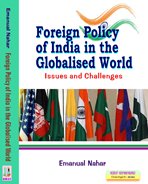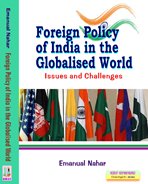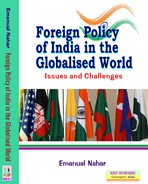Foreign Policy of India in the Globalised World: Issues and Challenges 2014
Foreign Policy of India in the Globalised World: Issues and Challenges 2014 is backordered and will ship as soon as it is back in stock.
Couldn't load pickup availability
Genuine Products Guarantee
Genuine Products Guarantee
We guarantee 100% genuine products, and if proven otherwise, we will compensate you with 10 times the product's cost.
Delivery and Shipping
Delivery and Shipping
Products are generally ready for dispatch within 1 day and typically reach you in 3 to 5 days.
Book Details
-
Publisher: Enkay Enterprises
-
Author: Nahar, Emanual
-
Edition: First Edition
-
Binding: Hardcover
-
Number of Pages: 384
-
Release Date: 01-12-2014
-
ISBN: 9788189331412
About The Book
Indian Foreign Policy doctrine was shaped by former Prime Minister Pt. Jawahar Lal Nehru in the Cold war period when the world was divided in to two power blocs. “Our foreign policy is one of keeping aloof from the big blocs of nations-rival blocs-and being friendly to all countries and not becoming entangled in any alliances, military or other, that might drag us into any possible conflict.” India opted for a non-aligned doctrine which makes it the leader of developing or third world countries. After the end of Cold war period, power politics between the two blocs ends and the idea of non-aligned doctrine becomes irrelevant. India played a positive role in the consolidation of third world and NAM for restructuring of international economic relations. The changes were brought in international organizations like UN, IMF and WTO. The hegemony of superpower countries are still established over these international organizations. They are making use of these institutions to promote their own interests. India raised the economic issues at many international organizations and tries to solve these problems with the help of other nations. India always tries to seek the co-operation of members of non-alignment and SAARC to address and solve the problem of economic and environment issues in North-South summits. In the absence of two super blocs, NAM is still relevant for India as it is a big platform for member countries to extent economic co-operation between them and come out of food and energy security problems through mutual exchange of surplus food and energy.”Our foreign policy has thus this positive aspect of peace. The other positive aspects are an enlargement of freedom in the world, replacement of colonialism by free and independent countries and a larger degree of cooperation among nations.
This first edition hardcover by Emanual Nahar, published by Enkay Enterprises and released on December 1, 2014, offers an in-depth exploration of its subject in English. With 384 pages, the book provides a comprehensive understanding of its topic, making it a valuable resource for readers interested in the field. The durable hardcover binding ensures that the book will remain in excellent condition for years, making it a lasting addition to any library. Whether you're seeking to expand your knowledge or gain new insights, this book promises an enriching and engaging reading experience.





